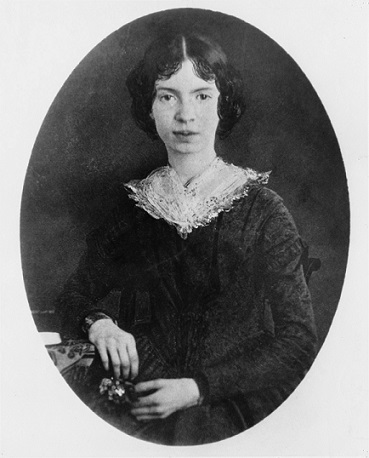|
home | what's new | other sites | contact | about |
||
|
Word Gems exploring self-realization, sacred personhood, and full humanity
Emily Dickinson I gave myself to Him
Emily Dickinson (1830-1886)
This poem revolves around the subject of love and marriage. It's important for the reader to understand the traditions of marriage during the 19th century. During this time period, a large percentage of marriages were made out of convenience, not because of love. This was even more so, for people in Emily Dickinson's social class. Only a few people of the lower social economic class had more of an option on deciding who they were going to marry. Most marriages for the higher social economic classes were either arranged or had to be approved by the parents. It was uncommon for someone to marry outside their social class. Women, during this period, did not have many freedoms. There was a very small amount of jobs women were allowed to do and many chose to marry in the end. Holding private property and gaining custody of children (if a divorce occurred) was nearly impossible. Women were still subjugated during 19th century. They were seen as almost second class. They belonged in the "domestic sphere" of society, as submissive housewives. This poem addresses the reality of many marriages during the 19th century. While it may be an anti-marriage poem to some, we must understand that Emily Dickinson wrote many poems about marriage, some which supported marriage. Even though Emily Dickinson, chose not marry anyone herself. Her poetry reflects different views towards marriage. This one portrays a bleak view on marriage. First stanza The speaker of this poem is the bride, who has just married. But no joy or love is reflected in the poem itself. Instead, she illustrates the marriage as a "contract." Marriage is nothing but a business transaction between two people. But more importantly, this transaction means the loss of a "life". In the first two lines, the speaker describes how the contract was "ratified". She gave herself to him as "pay," while he took "himself" for pay. In other words, she gave herself as payment, but he did not. An equal exchange did not occur because only she was required to give her life. This is important, because it references back towards marriage during the 19th century and before. Marriage was always a union that brought certain expectations, especially when it came to women. A woman was expected to become the submissive housewife, devoted to her home and to her husband. The husband was meant to be the provider of the household. The same type of "devotion" was not expected of him. Second Stanza In this stanza, we learn what the husband will provide as an exchange for the speaker's life. "Wealth", meaning that he will provide a source of income for her. He will become the "provider." But the speaker knows that material things can only do so much. She knows that happiness isn't always brought by the material aspects of life. She doubts that her future when she states "Myself a poorer prove" and refers her husband as a "purchaser". By using this term to represent her husband, she no longer views herself as an equal, but as a product. She becomes the product her "purchaser" is receiving, due to the contract. In the the third stanza, she depicts herself as "cargoe." But more than just being the product, she also has her duties to carry out. She must be loyal and serve her husband, "the daily own -- of love". She must show her husband "love" because he is the owner, she is in fact, the product. The lack of love in this marriage is emphasized on this stanza the most. The marriage has no love, it is not a bond or a union, it is a transaction. Fourth and Fifth Stanzas In these two stanzas, the speaker refers to her marriage as a "sweet debt - each night to owe". This oxymoron, confuses some readers. Even though it is a debt that she will continually have to pay for the rest of her life, she still refers to it as "sweet". Meaning, that the physical (sexual) aspects of the relationship don't always need to involve "love", in order for it to be pleasurable. In the last stanza, the speaker sums up the reality of marriage for people. Some may find it "mutual gain" in which both parties are happy with their part of the deal. The wife gains the financial security she needs, while the husband gains a devoted wife. But this only occurs when both parties are faced with "mutual risks." The poem ends with the speaker claiming that this was not the case when it came to her marriage. Instead, she has the "debt of life", which, she "owes" every night and will continue to "owe" every night. She does not pay, but continues to owe. This means that her debt will never be paid, because her life does not equal to what the husband is providing. Therefore, her debt is "insolvent" every noon, meaning every day.
|
||
|
|
